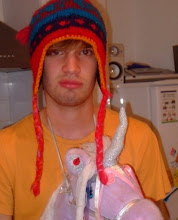
A spot on any of the NME tours is pretty much guaranteed to give any band a massive boost into popularity, whether interesting or not. There’s usually a pretty standard formula for the line-ups when the magazine are picking them, but the openers this year make quite a change. Nutter-punk outfit, Flats start the night off by pissing all over the trend of hushed indie bands that the NME has been whoring out over the last couple of years. It’s only a momentary shock though, as the arrival of Chapel Club brings all the terrified trendy haircuts away from the back wall of the Wedge and up to the front of the stage. The young band, and drummer possess the rare quality of restraint, and resist any urge to speed their songs up live. For a band like Flats, the faster the songs are played the better, but Chapel Club’s impact comes from their steady, simple beats driving along an indecipherable whirl of guitars and synths. With soothing vocals and guitars concealed by a wall effects, the band join the list of new artists pointing towards a change in direction for indie music. The sharp, stabbing guitars of the ‘noughties’ (sorry) are gradually being replaced with a soft, but far from boring, new sound.
While Flats may have made Chapel Club appear tamer than usual, The Joy Formidable definitely kicked things up another notch as headliners. At a glance of the stage, you could easily underestimate the band, led by fairly meek looking frontwoman, Ritzy and surrounded by birdcages filled with fairy lights. However, the three-piece’s intentions are made clear not long after as more pounding drums fill the room, this time accompanied by similarly intense guitars and vocals, and any timidity vanishes from Ritzy’s demeanour. While it would be it would be slightly stereotypical to compare them to the only female fronted guitar bands I can think of at this point in time, Blood Red Shoes and The Subways do spring to mind. Even so, there’s something about The Joy Formidable that could see them faring a little better in the mainstream (if that kind of thing floats your boat). They combine interesting rhythms with uncomplicated riffs and hooky vocals in a way that’s easy to listen to too but still keeps you thinking and leaves you guessing. The Radar Tour has seen the likes of Friendly Fires, La Roux and Marina and The Diamonds into large-scale success, and there’s no reason why any of these bands shouldn’t have the same outcome. Except Flats, they might struggle on daytime Radio 1.



